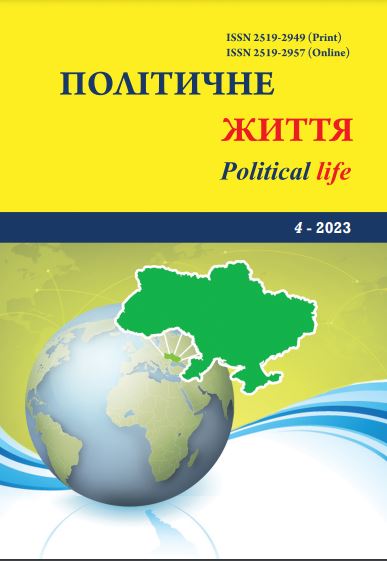German-Polish relations: asymmetry of interests and mutual perception
DOI:
https://doi.org/10.31558/2519-2949.2023.4.18Keywords:
German-Polish relationship; Germany; Poland; asymmetry of interests; mutual perception; asymmetric relationsAbstract
The purpose of the study is to analyze the asymmetry of interests and mutual perception in German-Polish relations, to consider them through the prism of asymmetry, to determine the level of its danger and destructive effects. German-Polish relations encompass a wide range of disparities in the socio-economic, political, and military spheres. The relationship between Germany and Poland is a typical model of asymmetric interaction between two asymmetric powers, with different ways of pursuing interests, despite numerous common features. The specifics and development of these relations, determined by historical, geographical, economic, and cultural factors, are a kind of key to understanding the complex nature of asymmetric relations. The lack of not only symmetry of potentials and decision-making, but also interests, goals, aspirations between Germany and Poland moves their interaction into the plane of asymmetric relations, which are sometimes extremely difficult to bring to the level of identical perception of each other. The asymmetry of interests can generate conflict situations and the search for reconciliation between the parties is rather complicated. The vector of development of relations between countries is influenced by the asymmetry of mutual perception. The advantage of the Federal Republic of Germany over the Republic of Poland in terms of power indicators, quantitative and qualitative parameters of socio-economic development, creates a basis for asymmetry of interests and mutual perception. Despite their mutual interest in the development of trade and economic cooperation, the Federal Republic of Germany and the Republic of Poland act as competing parties and express different visions of the further development of the EU, the conditions and prospects of bilateral cooperation, which largely depends on the level of interdependence and asymmetry of potentials.
The consequence of the asymmetric nature of German-Polish relations, the asymmetry of interests and mutual perception are bursts of tension and hostility.
References
Western Institute Zygmunt Wojciechowski. Between friendship and frustration – Poland and Germany 30 years after signing the Neighborhood Treaty. Poznan, 2021. 210 pp.
Wоycicki K., Czachur W. Poland in conversation with Germany On the difficulties of the German-Polish dialogue and its European challenges. Wrocław, 2009. 147 р
Szwed S. Poland, Germany and state power in post-cold war Europe : asymmetry matters. London, United Kingdom: Palgrave Macmillan, 2019. 321 р.
Womack B. Asymmetry and International Relationships. New York: Cambridge University Press, 2016. 220 рр.
Womack B. Asymmetry and China’s Tributary System Oxford, Journals Social Sciences Chinese Journal of International Politics. Vol. 5, Issue 1, March, 2012. Access mode: https://academic.oup.com/cjip/article/5/1/ 37/343602
Kącka K. On both sides of the Oder. Poland, Germany and their mutual relations in the 20th and 21st centuries – selected problems, edited by. Toruń, 2011. 275 pp.
Womack B. Asymmetry Theory and China’s Concept of Multipolarity, Journal of Contemporary China, 13 (39), May, 2004. Access mode: https://pdfs.semanticscholar.org/ed61/fecb11d32e3eda43377b76c31d4799483056.pdf
Szabo, S. F. Germany, Russia, and the Rise of Geo-Ecomomics. London: Bloomsburgy Publishing, 2015. 176 р.
Miszczak K. German-Polish relations in times of crisis in Eastern Europe. Journal for Foreign and Security Policy, volume 8, 2015. рр. 461-473.
Yavorska G. Changes in Poland’s foreign policy: challenges and opportunities for Ukraine. National Institute of Strategic Studies. Series «International Relations», 2015, No. 3. Access mode: http://www.niss.gov.ua/articles/1912/
Global Firepower. World Military Strength Rankings. 2023. Access mode: https://www.globalfirepower.com
Lepiarz J. Dispute over reparations: Poland increases pressure on Germany. German wave. January 6, 2023. Access mode: https://p.dw.com/p/4LlEJ
Kononchuk V., Kwiatkovska A. Poland – Germany – Ukraine. How to avoid kitsch reconciliation? New Poland. February 20, 2023. Access mode: https://novapolshcha.pl › article › polsha-nimechchina...
Stolarczyk M. Convergence and differences of interests in Polish-German relations in 1989–2009. Katowice: Publishing House of the University of Silesia, 2010. 693 pp.
Poland – Germany. New Relationships. Freedom Institute. Access mode: https://instytutwolnosci.pl.

